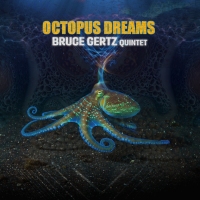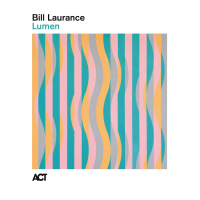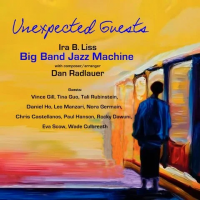Home » Jazz Articles » Extended Analysis » Brecker Bros.: The Complete Arista Albums Collection
Brecker Bros.: The Complete Arista Albums Collection
Miles Davis
trumpet1926 - 1991

Chick Corea
piano1941 - 2021

John McLaughlin
guitarb.1942

Return to Forever
band / ensemble / orchestra
Mahavishnu Orchestra
band / ensemble / orchestrab.1971

Stevie Wonder
vocalsb.1950

Earth, Wind & Fire
band / ensemble / orchestra
Weather Report
band / ensemble / orchestra
Joe Zawinul
keyboards1932 - 2007
But in a certain part of Manhattan, something else was going on. Beginning in the late '60s, a collective of roughly 30 musicians moved from New York to Woodstock, including

Mike Mainieri
vibraphoneb.1938

Warren Bernhardt
pianob.1938

Tony Levin
bassb.1946

Steve Gadd
drumsb.1945

Joe Beck
guitar1945 - 2008

David Spinozza
guitarTwo other members of Mainieri's musical commune were the brothers Brecker—trumpeter

Randy Brecker
trumpetb.1945

Michael Brecker
saxophone, tenor1949 - 2007

Horace Silver
piano1928 - 2014

Jack McDuff
organ, Hammond B31926 - 2001
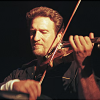
Jerry Goodman
violin
John Abercrombie
guitar1944 - 2017

Billy Cobham
drumsb.1944
While Dreams didn't fare particularly well, Columbia wasn't ready to give up on the group yet, and so with prominent soul guitarist

Steve Cropper
guitar, electricb.1941

Will Lee
bassb.1950

Don Grolnick
piano1947 - 1996

Barry Rogers
trombone1935 - 1991
Bob Suttmann
trombone
David Sanborn
saxophone1945 - 2024

Muddy Waters
guitar1915 - 1983

James Cotton
harmonicab.1935

Harvey Mason
drumsb.1947

Herbie Hancock
pianob.1940

Ralph MacDonald
percussion1944 - 2011

Shirley Scott
organ, Hammond B31934 - 2002

Dreams may have been a pop band and The Brecker Brothers unmistakably a jazz group, but there were plenty of connecting threads between the two. Dreams separated itself from most other horn-led groups of the time by emphasizing spontaneity rather than the rigorous horn charts of most other bands. Spontaneous arrangements were de rigueur, even as the group focused largely on song form. And working with Cropper on Imagine My Surprise had a longer-lasting influence on the two Breckers—and not just them. When The Brecker Brothers launched with its self-titled 1975 debut on Arista, there was no mistaking that it was, indeed, a jazz band, but one with an emphasis on soul and funk rather than rock and roll—the flagship for an unmistakably New York sound known as "uptown."
It was a sound which became even more prominent when artists like Sanborn and guitarist

Steve Khan
guitarb.1947
The Breckers weren't immune to the trends of the time, however, and so as the dreaded disco emerged as a dominant commercial force, so, too, were The Brecker Brothers encouraged to incorporate some of its elements, to varying degrees of success. But the core strengths of the band—the detailed, complex instrumental charts written largely by the two brothers (Randy first; Michael's aptitude for writing came a little later), the exceptional chemistry of literally every incarnation; and the remarkable frontline simpatico shared by siblings Randy and Michael (and, when it was a three-piece horn section, altoist Sanborn, too)—made every record a winner, even if some of there was some inconsistencies and some albums were absolutely better than others.
The group broke up after a string of six records on ex-Columbia mogul Clive Davis' fledgling Arista Records between 1975 and 1981, with Michael going onto a particularly successful solo career, but Randy and Michael reunited The Brecker Brothers again in the early 1990s for two fine albums—The Return of the Brecker Brothers (GRP, 1992) and Out of the Loop (GRP, 1994)—plus a couple of tours with a largely revamped lineup. Furthermore, Randy may have been the titular head of 2006's Some Skunk Funk (Telarc, 2006), a collaboration with Germany's WDR Big Band and orchestrator/arranger

Vince Mendoza
composer / conductorb.1961

Peter Erskine
drumsb.1954

Jim Beard
piano1960 - 2024
Which leaves The Brecker Brothers' The Brecker Bros.: The Complete Arista Albums Collection, which collects all six of the group's recordings from 1975's debut to 1981's superb swan songStraphangin', with the added bonus of two albums previously only available on CD in Japan (other than a briefly released American compilation that collected eight of the two albums' total twelve tracks). Blue Montreux and Blue Montreux II, both released in 1979, documented a stellar performance at Switzerland's 1978 Montreux Jazz Festival under the moniker "The Arista All-Stars"—organized and led by Mike Mainieri and, in addition to the core group of Randy and Michael Brecker, keyboardist Warren Bernhardt., bassist Tony Levin, drummer

Steve Jordan
drumsb.1957

Larry Coryell
guitar1943 - 2017

Eddie Gomez
bassb.1944
It's a spartan package: a clamshell box with the same design as all the box sets being released by Legacy Recordings through its online PopMarket store—with a booklet that, in addition to a detailed track and personnel listings, has only a single, two-paragraph intro by Randy, and each album housed in a mini-LP replication of the original vinyl releases. But what's most important is the music, and if one thing becomes absolutely crystal clear after digesting nearly six hours of vintage Brecker Brothers, it's just how important and influential both the group—and the many players who passed through its doors in its six years of life—would become. There's the occasional misstep to be found, but overall, this vintage soul-drenched, funkified and occasionally discofied collection of 59 songs on five studio and three live albums remains as fresh, invigorating and relevant today as it did nearly 37 years ago, when The Brecker Brothers' first incarnation, with Randy producing, stepped into New York's Secret Sound Studios to record an album that would forever change the landscape of jazz-rock fusion.
 The Brecker Bros. (Arista, 1975) is as near a perfect debut as is likely to be heard anywhere. From the opening one-two punch of the up-tempo "Some Skunk Funk" and greasier "Sponge," a number of Brecker Brothers markers are already defined: forceful three-voice horn lines; guitar and keyboards support, both comping and providing additional counter-melodies; and unshakable, in-the-pocket grooves from bassists and drummers joined at the hip. This is rock-edged music to be sure, but it couldn't have come from anywhere else but a collective with a firm foothold in the jazz tradition. And when it comes to soloing, beyond the intrinsic virtuosity of everyone involved, this is a truly electric and electrified band, with Randy's first trumpet solo on "Some Skunk Funk" a searing, soaring exploration of melody and sound. Michael's opening salvo is more decidedly acoustic, but he's already in the process of formulating the signatures at this early stage (still in his mid-twenties), and it's abundantly clear that he's already a force with which to be reckoned; a player who will go on to influence both peers like
The Brecker Bros. (Arista, 1975) is as near a perfect debut as is likely to be heard anywhere. From the opening one-two punch of the up-tempo "Some Skunk Funk" and greasier "Sponge," a number of Brecker Brothers markers are already defined: forceful three-voice horn lines; guitar and keyboards support, both comping and providing additional counter-melodies; and unshakable, in-the-pocket grooves from bassists and drummers joined at the hip. This is rock-edged music to be sure, but it couldn't have come from anywhere else but a collective with a firm foothold in the jazz tradition. And when it comes to soloing, beyond the intrinsic virtuosity of everyone involved, this is a truly electric and electrified band, with Randy's first trumpet solo on "Some Skunk Funk" a searing, soaring exploration of melody and sound. Michael's opening salvo is more decidedly acoustic, but he's already in the process of formulating the signatures at this early stage (still in his mid-twenties), and it's abundantly clear that he's already a force with which to be reckoned; a player who will go on to influence both peers like 
Bob Berg
saxophone1951 - 2002

Chris Potter
saxophone, tenorb.1971
There isn't a single weak track in the bunch, and if Michael ultimately emerged as the more influential player, it's a curiosity since his brother has, in the ensuing decades, proven an equally distinctive and diverse player, as comfortable in the modal burn setting of saxophonist

Dave Liebman
saxophoneb.1946
If the two vocal tracks on The Brecker Bros. both fit in perfectly with the band's New York vibe and do nothing to dilute the album's collective strength, Back to Back (Arista, 1976) unfortunately shifts the balance, with all but three tracks either featuring lead vocals or a group of background vocalists. The playing, under the covers, is as strong as ever, withChristopher Parker (soon to be a member of Stuff, with another Brecker Brothers alum, drummer

Steve Gadd
drumsb.1945
Possibly one of the reasons for Back to Back being a less satisfying—and, ultimately, more dated—record is that Randy has relinquished much of the writing to collaborative pieces by various members of the band. It's no coincidence that the three strongest tracks on the record are those written by Randy—whose complex yet fiery "Slick Stuff" features set-defining solos from both brothers, but in particular Michael, whose muscular ability to navigate any set of changes with absolute aplomb was clearly growing in leaps and bounds—and Michael's compositional debut with The Brecker Brothers, "Night Flight," where guest percussionists

Sammy Figueroa
percussion With the advent of disco, and The Brecker Brothers playing on a host of pop, rock and disco sessions—a record featuring "The Brecker Brothers" in the personnel list by now an attraction unto itself—so it's no surprise, perhaps, that Don't Stop the Music should move in that direction, for better and for worse. The first Brecker Brothers record not produced by either Randy or the two brothers together, Don't Stop the Music was produced by Canadian Jack Richardson, a seemingly odd choice given his history producing groups like The Guess Who, Alice Cooper and Bob Seger. But if Don't Stop the Music has a handful of truly cringe-worthy songs, including the opening "Finger Lickin' Good," instrumental tracks like Michael's dynamic "Funky Sea, Funky Dew" balance things out, in this case featuring another explosive solo that demonstrates the saxophonist's growing strength across the entire range of his tenor, and an ability to be both sophisticated and visceral at the same time.
With the advent of disco, and The Brecker Brothers playing on a host of pop, rock and disco sessions—a record featuring "The Brecker Brothers" in the personnel list by now an attraction unto itself—so it's no surprise, perhaps, that Don't Stop the Music should move in that direction, for better and for worse. The first Brecker Brothers record not produced by either Randy or the two brothers together, Don't Stop the Music was produced by Canadian Jack Richardson, a seemingly odd choice given his history producing groups like The Guess Who, Alice Cooper and Bob Seger. But if Don't Stop the Music has a handful of truly cringe-worthy songs, including the opening "Finger Lickin' Good," instrumental tracks like Michael's dynamic "Funky Sea, Funky Dew" balance things out, in this case featuring another explosive solo that demonstrates the saxophonist's growing strength across the entire range of his tenor, and an ability to be both sophisticated and visceral at the same time. Randy's "Squids" is another highlight, and if Michael was, by this time, growing as a writer and establishing his own style, albeit one that fit tightly within the sibling chemistry of The Brecker Brothers, so, too, was Randy writing even stronger material, with the trumpeter's "Petals" a gorgeous yet under-the-covers-complex ballad featuring Randy at his most lyrical, while his "Tabula Rasa" closes the album on a more powerful note. And if Bob Mann was—and has continued to be—a terrific ensemble player, at this point in time Khan was a far more dominant player, with a clearer, more distinctive voice that raised the bar for the group.
Don't Stop the Music suffers from the over-production that was becoming endemic at the time, though the added horns and strings do work on tracks like "Petals." But it seems clear that even the Breckers were feeling a need to strip down and return to some of their more flat-out funk roots. The aptly titled Heavy Metal Bebop (Arista, 1978) was a welcome return to all-instrumental music; even the one vocal track, the opening "East River," dispenses with the disco beats and returns to some four-on-the floor funk that absolutely screams New York attitude.
The rest of the record is a live recording from My Father's Place in Roslyn, New York, and features a revamped and streamlined quintet lineup which includes drummer

Terry Bozzio
drumsb.1950

Frank Zappa
guitar, electric1940 - 1993

Barry Finnerty
guitar, electricb.1951

Hubert Laws
woodwindsb.1939

Thad Jones
trumpet1923 - 1986

Mel Lewis
drums1929 - 1990

Chico Hamilton
drums1921 - 2013

Don Cherry
trumpet1936 - 1995
Randy's "Inside Out" opens the live set, a rocking blues announcing that The Brecker Brothers of 1978 had completely dispensed with any suggestions of either disco or over-production. Like Miles Davis, Randy added some keyboards to the mix, his electric trumpet matched in sonority by everyone in the band—even Michael, who's also credited as played "electric saxophone." If his extended solo on "Inside Out" is largely acoustic (only bringing in some filtering towards the end), it still burns with an electrified energy bolstered by a thoroughly nuclear band. Finnerty matches the Breckers note for burning note with an ability to, as the song's title suggests, take a simple construct and move from the inside to the outside and back again, with a heavily fuzz-toned guitar and the kind of rock-stance pyrotechnics that the Breckers had avoided...until now.
 From there things only get more intense, justifying the album title Heavy Metal Bebop. "Some Skunk Funk" is taken at an almost impossibly fast clip, as Randy's solo brings in more electronics than on past recordings—pitch shifting, envelope filtering and more—and if Bozzio's frenetically funky drum work is augmented by some post-production percussion from Figueroa and Cruz, Jason's bass work remains untouched, a combination of deft finger- work and some gut-punching, thumb-popping and palm-slapping. His r©”sum©” to date may not have suggested it, but here, Jason proves himself to be one badass mo'fo.' "Sponge" is also taken at a faster pace than on The Brecker Bros., a relentless traded off between Finnerty and the two Breckers, building to an exhausting but exhilarating climax. Despite all the high energy gymnastics, the quintet still proves capable of the more expansive dynamics of "Funky Sea, Funky Dew," closing with a take on "Squids" that rocks out even as it retains the Latin rhythms that are an equal undercurrent to the tune.
From there things only get more intense, justifying the album title Heavy Metal Bebop. "Some Skunk Funk" is taken at an almost impossibly fast clip, as Randy's solo brings in more electronics than on past recordings—pitch shifting, envelope filtering and more—and if Bozzio's frenetically funky drum work is augmented by some post-production percussion from Figueroa and Cruz, Jason's bass work remains untouched, a combination of deft finger- work and some gut-punching, thumb-popping and palm-slapping. His r©”sum©” to date may not have suggested it, but here, Jason proves himself to be one badass mo'fo.' "Sponge" is also taken at a faster pace than on The Brecker Bros., a relentless traded off between Finnerty and the two Breckers, building to an exhausting but exhilarating climax. Despite all the high energy gymnastics, the quintet still proves capable of the more expansive dynamics of "Funky Sea, Funky Dew," closing with a take on "Squids" that rocks out even as it retains the Latin rhythms that are an equal undercurrent to the tune. If some considered Heavy Metal Bebop to be excessive—and, to some extent, it was, but in the best possible way— then D©”tente (Arista, 1980) seemed like a step backward, to the more song-oriented approach of Back to Back and Don't Stop the Music. But with keyboardist

George Duke
piano1946 - 2013

Billy Cobham
drumsb.1944

Marcus Miller
bassb.1959

Steve Gadd
drumsb.1945

Steve Jordan
drumsb.1957

Don Grolnick
piano1947 - 1996

David Spinozza
guitar
Hiram Bullock
guitar, electric1955 - 2008
The grooves are deep, and with vocalists including Duke and Carl Carlwell (a tremendous session singer with Duke,

Earth, Wind & Fire
band / ensemble / orchestraThe instrumental tracks reflect continued compositional growth for both Breckers. "Tee-d Off," no doubt written for

Richard Tee
keyboards1943 - 1993

Paul Simon
composer / conductorb.1941
 While The Brecker Brothers' first three albums all received Grammy nominations, neither Heavy Metal Bebop nor D©”tente were given then same nod. Nor did Straphangin' (Arista, 1981), but for the Breckers' final recording as a group before reuniting again in the early 1990s, they once again stripped down to a lean, mean instrumental group and delivered their best record since their six year-old debut. With Gray back from D©”tente and Finnerty back from Heavy Metal Bebop, one of the biggest reasons for Straphangin''s success is its rhythm section. By this time, bassist Marcus Miller had already made a name for himself in the pop world, recording with Aretha Franklin, Elton John, Melba Moore and Joan Armatrading; in the jazz world, he'd established cred with The
While The Brecker Brothers' first three albums all received Grammy nominations, neither Heavy Metal Bebop nor D©”tente were given then same nod. Nor did Straphangin' (Arista, 1981), but for the Breckers' final recording as a group before reuniting again in the early 1990s, they once again stripped down to a lean, mean instrumental group and delivered their best record since their six year-old debut. With Gray back from D©”tente and Finnerty back from Heavy Metal Bebop, one of the biggest reasons for Straphangin''s success is its rhythm section. By this time, bassist Marcus Miller had already made a name for himself in the pop world, recording with Aretha Franklin, Elton John, Melba Moore and Joan Armatrading; in the jazz world, he'd established cred with The 
Crusaders
band / ensemble / orchestrab.1960

Grover Washington, Jr.
saxophone1943 - 1999

Dave Grusin
pianob.1934

Miles Davis
trumpet1926 - 1991
But at this point he was still on the upward trajectory, a hungry player who, combined with another up-and-comer, drummer

Richie Morales
drumsAs for Randy, the title track begins with an odd fanfare before diving into one of his greasiest pieces of funk ever. The slower- tempo, gospel-tinged "Threesome" feels like something the Saturday Night Live band would play—and although brother Michael played in the band for some time in the 1980s, he never did. "Jacknife" starts out in electric territory, with Miller's Mu-troned electric bass setting the tone, but by mid-section the group is swinging in a way of which it was always capable, but which it had never actually done before, for both Randy and Michael's solo.
In fact, the album's greatest strength is that, while there's still plenty of electric energy to be found in Finnerty's overdriven guitar, Gray's Fender Rhodes and synthesizer, and Miller's electric bass, it's the most acoustic-sounding record of the group's career. It appears as if the Breckers have finally found a balance between the soul, funk and R&B that was one group of influences, and the more acoustic jazz tradition that formed another. By this time they'd recorded a couple of particularly outstanding acoustic dates with pianist

Hal Galper
piano1938 - 2025

Pat Metheny
guitarb.1954
The Complete Arista Albums Collection includes two more recordings that, while not Brecker Brothers albums, certainly comfortably fit within its sphere. During this period, the Breckers opened a club in New York, 7th Avenue South, in 1977, closing its doors a decade later. Amongst the musicians who were regulars at the club were old friends, vibraphonist Mike Mainieri, guitarist Steve Khan and pianist Warren Bernhardt—Arista artists all. And so, in 1978 Mainieri instigated a group that would be called The Arista All Stars, featuring, in addition to these five artists, another friend from the White Elephant days, bassist Tony Levin (who'd soon desert jazz for greater fame and fortune with art rockers

King Crimson
band / ensemble / orchestrab.1969

Larry Coryell
guitar1943 - 2017

Eddie Gomez
bassb.1944

Steps Ahead
band / ensemble / orchestrab.1979
 The set list of these two records—seven tunes on one, five on the other— includes a fiery version of Randy's "Rocks" on Blue Montreux, with Coryell a featured soloist after Randy and Michael trade-off to build the song to a fever pitch. Coryell also appears on "A Funky Waltz," which opens Blue Montreux II, a song written by drummer Alphonse Mouzon for The Eleventh House, another fusion group, and its 1974 Vanguard debut, Introducing the Eleventh House with Larry Coryell.
The set list of these two records—seven tunes on one, five on the other— includes a fiery version of Randy's "Rocks" on Blue Montreux, with Coryell a featured soloist after Randy and Michael trade-off to build the song to a fever pitch. Coryell also appears on "A Funky Waltz," which opens Blue Montreux II, a song written by drummer Alphonse Mouzon for The Eleventh House, another fusion group, and its 1974 Vanguard debut, Introducing the Eleventh House with Larry Coryell. But it's the core group that makes the addition of these two records so welcome to this box set. Khan contributes the ethereal ballad "Candles," from 1978's Arrows (Columbia), and a new tune, "Cloud Motion," that hints rhythmically at Khan's Latin proclivities to come. Randy Brecker's "Buds," too, grooves with a Latin vibe; a new tune that he'd not record on an album of his own until Into the Sun (Concord, 1995), but here features a lengthy trumpet solo and some empathic interaction with Bernhardt. From the keyboardist comes the title track to his soon-to-be-released solo piano recording, Floating (Arista, 1979), but here given a far more propulsive yet somehow, well, floating arrangement.
The rest of the material comes from Mainieri. Two are new for the date: the soft trio for vibes, piano and trumpet that closes Blue Montreux ("The Virgin and the Gypy"); and the same record's title track, a lightly funky tune featuring a tart solo from Randy and a lengthy turn from the vibraphonist that, in just three minutes, justifies why, as he explained in his 2009 All About Jazz interview, that "It was kind of an inside album that seemed to influence some people; I remember [vibraphonist]

Joe Locke
vibraphoneb.1959
With Michael Brecker now gone and a Brecker Brothers tribute taken place in 2012 that was hopefully recorded—featuring Randy, together with The Return of the Brecker Brothers' guitarist

Mike Stern
guitarb.1953

Rodney Holmes
drums
George Whitty
keyboards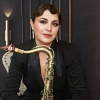
Ada Rovatti
saxophone, tenorb.1976

Oli Rockberger
piano and vocalsTrack Listing
CD1 (The Brecker Bros.): Some Skunk Funk; Sponge; A Creature of Many Faces;
Twilight; Sneakin' Up Behind You; Rocks; Levitate; Oh My Stars; D.B.B.
CD2 (Back to Back): Keep It Steady (Brecker Bump); If You Wanna
BoogieĪŁForget It; Lovely Lady; Night Flight; Slick Stuff; Dig a Little Deeper; Grease Piece; What
Can a Miracle Do; I Love Wasting' Time With You.
CD3 (Don't Stop the Music): Finger Lickin' Good; Funky Sea, Funky Dew;
As Long as I've Got Your Love; Squids; Don't Stop the Music; Petals; Tabula Rasa.
CD4 (Heavy Metal Bebop): East River; Inside Out; Some Skunk Funk;
Sponge; Funky Sea, Funky Dew; Squids.
CD5 (D©”tente): You Ga (Ta Give It); Not Tonight; Don't Get Funny With
My Money; Tee'd Off; You Left Something Behind; Squish; Dream Theme; Baffled; I Don't Know
Either.
CD6 (Straphangin'): Straphangin'; Threesome; Bathsheba; Jacknife; Why
Can't I Be There; Not Ethiopia; Spreadeagle.
CD7 (Blue Montreux): Blue Montreux; Rocks; I'm Sorry; Magic Carpet;
Buds; Floating; The Virgin and the Gypsy.
CD8 (Blue Montreux II): A Funky Waltz; Candles; Uptown Ed; Love Play;
Cloud Motion.
Personnel
Brecker Brothers
band / ensemble / orchestraRandy Brecker
trumpetMichael Brecker
saxophone, tenorDon Grolnick
pianoSteve Khan
guitarDavid Sanborn
saxophoneHarvey Mason
drumsWill Lee
bassBob Mann
guitarMike Mainieri
vibraphoneChristopher Parker
pianoSteve Gadd
drumsLarry Coryell
guitarMarcus Miller
bassHiram Bullock
guitar, electricWarren Bernhardt
pianoBarry Finnerty
guitar, electricTerry Bozzio
drumsGeorge Duke
pianoCD1 (The Brecker Bros.): Randy Brecker: trumpet, electric trumpet, flugelhorn, vocal
(8);
Michael Brecker: tenor saxophone; David Sanborn: alto saxophone; Don Grolnick: keyboards;
Bob
Mann: guitar; Will Lee: electric bass, vocal (5); Harvey Mason: drums; Ralph MacDonald:
percussion; Christopher Parker: additional drums (5).
CD2 (Back to Back): Randy Brecker: trumpet, electric trumpet,
flugelhorn,
vocal (8); Michael Brecker: tenor saxophone, flute; David Sanborn: alto saxophone; Don Grolnick:
keyboards;
Steve Khan: guitar; Will Lee: electric bass, lead vocal, background vocals (9); Christopher Parker:
drums; Ralph MacDonald: percussion; David Whitman: synthesizer programming; Luther
Vandross:
background vocals (1-3, 7, 9), background vocal arranger; Lew Del Gatto: baritone saxophone
(2);
Steve Gadd: drums (4, 9); Sammy Figueroa: percussion (4); Rafael Cruz: percussion (4); Dave
Friedman: marimba (6); Patti Austin: background vocals (9); Allee Willis: background vocals (9);
Robin Clark: background vocals (1-3, 7); Diane Sumler: background vocals (1-3, 7).
CD3 (Don't Stop the Music): Randy Brecker: trumpet, electric trumpet,
flugelhorn,
vocal (8); Michael Brecker: tenor saxophone, flute; David Sanborn: alto saxophone; Don Grolnick:
keyboards; Steve Khan: electric guitar, 12-string guitar; Will Lee: electric bass, lead vocal,
background vocals (1, 5); Christopher Parker: drums; Ralph MacDonald: percussion; Doug Riley:
keyboards, horn and string arrangements; Christine Faith: background vocals (1, 5); Josh Brown:
background vocals (1, 5); Doug Billard: background vocals (3); Beverly Billard: background
vocals
(3); Jerry Friedman: guitar (1), electric piano (5); Sandy Torano: guitar (1); Hiram Bullock: guitar
(2-
4, 6); Steve Gadd: drums (4, 6); Lenny White: drums (7); Sammy Figueroa: congas (7). Horn
Section:
Alan Rubin: trumpet; Randy Brecker: trumpet; Michael Brecker: tenor saxophone; Lou Marini: alto
saxophone; Lew Del Gatto: baritone saxophone; Barry Rogers: trombone; David Taylor: bass
trombone. String Section: Aaron Rosand: violin; Guy Lumia: violin; Paul Gershman: violin; Harry
Lookofsky: violin; Sanford Allen: violin; Ariana Bronne: violin; Harold Kohon: violin; Matthew
Raimondi: violin;; Peter Dimitriades: violin; Lamar Alsop: viola; Richard Maximoff: viola; Alfred
Brown: viola; Jesse Levy: cello; Richard Locker: cello.
CD4 (Heavy Metal Bebop): Randy Brecker:, electric trumpet, keyboards,
handclaps
(1); Michael Brecker: electric tenor saxophone, handclaps (1); Barry Finnerty: guitar,
Guitarorganizer, background vocal; Neil Jason: bass, lead vocal (1); Terry Bozzio: drums,
background
vocal; Sammy Figueroa: percussion; Rafael Cruz: percussion; Paul Schaeffer: Fender Rhodes
piano
(1); Alan Schwartzberg: drums (1); Kash Monet: percussion (1), background vocal (1), handclaps
(1);
Victoria: tambourine (1); Jeff Schoen: background vocal; Roy Herring: background vocal; Bob
Clearmountain: handclaps (1); various friends: handclaps (1).
CD5 (D©”tente): Randy Brecker: trumpet (1-9), lead vocal (1, 3),
handclaps (1,
3),
arrangement (1-6, 8), flugelhorn (2, 5, 8, 9), Prophet 5 (3); Michael Brecker: tenor saxophone (1-
9),
flute (2, 5), handclaps (1, 3), arrangement (1-6, 7, 9); Don Grolnick: Yamaha CP70 (1, 2), Fender
Rhodes electric piano (7); David Spinozza: guitar (1-3, 7); Jeff Mironov: guitar (1-3, 7); Marcus
Miller: bass (1, 2, 7); Steve Gadd: drums (1-3, 7); Paulinho DaCosta: percussion (1, 3); George
Duke:
lead vocal (1), clavinet (2), background vocal (2), Yamaha CP 70 (3), Prophet 5 (4, 8, 9),
Oberheim 4-
Voice Polyphonic synthesizer (6); Carl Carlwell: lead vocal (1, 2), handclaps (1, 3), background
vocal
(2); D.J. Rogers: lead vocal (1), vocal adlib (1); Luther Vandross: background vocal (1, 3, 5), group
vocal arrangement (3); Utlanda McCullough: background vocal (1, 3, 5); Fonzi Thornton:
background vocal (1, 3, 5); Paulette McWilliams: background vocal (1, 3, 5); Irene Cara:
background
vocal (1, 3, 5); Sue Ann Carlwell: handclaps, background vocal (2); Erik "Igor" Zobler: handclaps
(1);
Neil Jason: bass (2, 4, 5, 8, 9); Ralph McDonald: percussion (2, 5, 7); Bill Reichenbach: handclaps
(3);
Mark Gray: Fender Rhodes electric piano (4-6, 8, 9); Hiram Bullock: guitar (4-6, 8), 9; Steve
Jordan:
drums (4-6, 8, 9); Airto: percussion (6, 8, 9).
CD6 (Straphangin'): Randy Brecker: trumpet, flugelhorn; Michael
Brecker:
tenor
saxophone; Mark Gray: keyboards; Barry Finnerty: guitar; Marcus Miller: bass; Richie Morales;
drums; Sammy Figueroa: percussion (1, 3, 4, 5, 7); Manolo Badrena: percussion (1, 3, 4, 5, 7);
Don
Alias: percussion (6); Neil Jason: bass (7); Steve Jordan: drums (7); Airto: percussion (7).
CD7 (Blue Montreux): Randy Brecker: trumpet (1-3, 5-7); Michael
Brecker:
tenor
saxophone (1-6); Warren Bernhardt: piano (1, 3-7), Fender Rhodes electric piano (1), keyboards
(2-
6); Mike Mainieri: vibes (1-4, 6, 7), synthe-vibe (4), percussion (1, 2, 5); Steve Khan: guitar (1-6),
Larry Coryell: guitar (2); Tony Levin: bass (1-3, 5, 6), stick bass (4); Steve Jordan: drums (1-6).
CD8 (Blue Montreux II): Randy Brecker: trumpet (1, 5); Michael Brecker:
tenor
saxophone (1,3, 5), soprano saxophone (2); Warren Bernhardt: piano (3, 4), keyboards (1, 2, 4,
5),
MiniMoog (4); Mike Mainieri: electric vibes (2-5), synthe-vibe (4), percussion (2); Steve Khan:
electric guitar (1, 2, 4, 5), Larry Coryell: electric guitar (1); Tony Levin: electric bass (2, 4, 5),
electric
stick (1); Steve Jordan: drums; Eddie Gomez: acoustic bass (3).
Album information
Title: The Complete Arista Albums Collection | Year Released: 2012 | Record Label: Legacy Recordings
Tags
Comments
About Brecker Brothers
Instrument: Band / ensemble / orchestra
PREVIOUS / NEXT
Support All About Jazz
 All About Jazz has been a pillar of jazz since 1995, championing it as an art form and, more importantly, supporting the musicians who make it. Our enduring commitment has made "AAJ" one of the most culturally important websites of its kind, read by hundreds of thousands of fans, musicians and industry figures every month.
All About Jazz has been a pillar of jazz since 1995, championing it as an art form and, more importantly, supporting the musicians who make it. Our enduring commitment has made "AAJ" one of the most culturally important websites of its kind, read by hundreds of thousands of fans, musicians and industry figures every month.




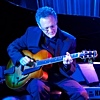
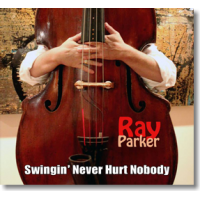




 Buy Now
Buy Now




